Hướng dẫn viết dạng compare and contrast essay trong IELTS Writing
Compare and Contrast essay sample IELTS là dạng bài được quan tâm nhiều hơn trong thời gian gần đây. Hãy để DOL trang bị trước cho bạn từ vựng, cấu trúc, và tư duy tiếp cận bài nhé.
DOL IELTS Đình Lực
Jan 04, 2023
2 mins read
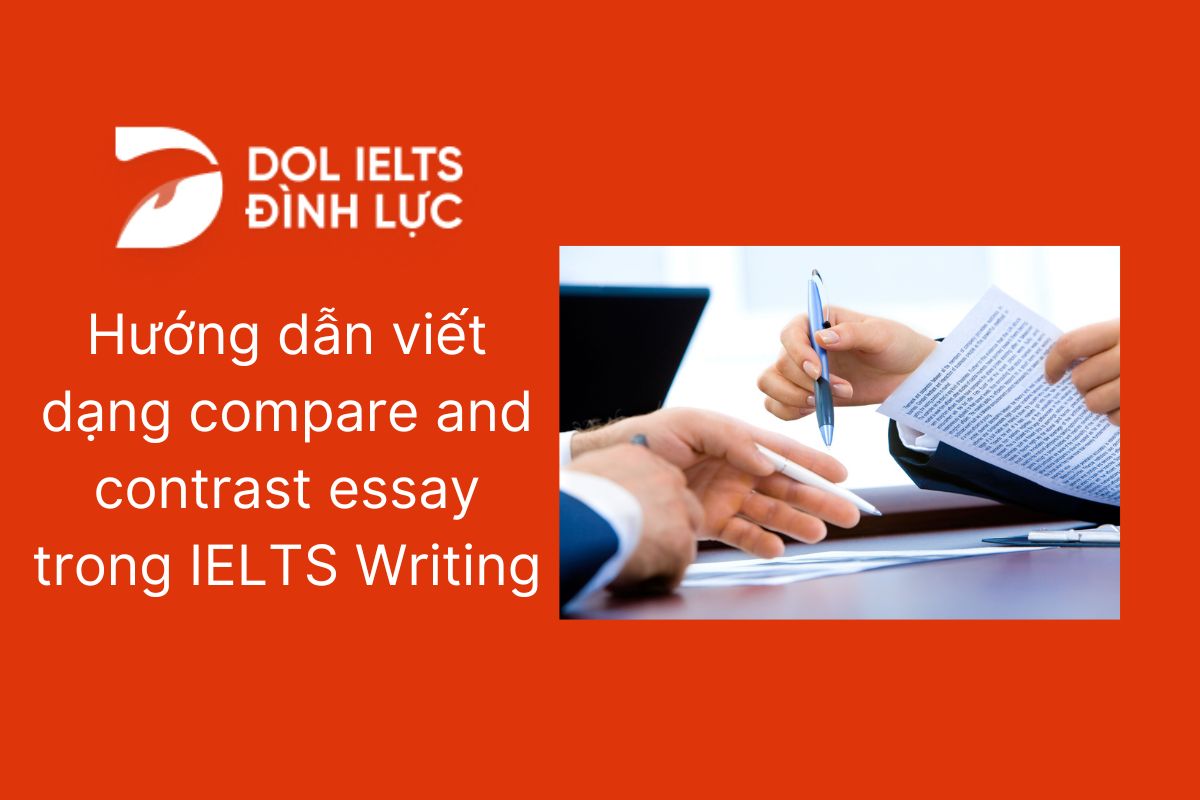
Table of content
1. Giới thiệu dạng bài Compare and Contrast IELTS Writing
2. Hướng dẫn cách làm Compare and Contrast IELTS Writing
2.1. Xác định đúng đề và yếu tố cần compare contrast
2.2. So sánh 2 đối tượng
2.3 Chọn lọc kỹ lưỡng
2.4 Xác định cấu trúc bài
2.5 Lập dàn ý
3. Cấu trúc và từ vựng thường dùng
4. Bài mẫu Compare and Contrast IELTS Writing
1. Giới thiệu dạng bài Compare and Contrast IELTS Writing
Trong dạng compare and contrast, các giám khảo IELTS kỳ vọng bạn sẽ so sánh và chỉ ra các điểm đối lập của 2 sự vât/hiện tượng. Vì thế, trước khi đặt bút viết, hãy chắc rằng bạn đã điểm ra được 2 điều trên. Cùng xem ví dụ nhé:
Some people want to live in a house while others prefer living in an apartment.
Does living in a house bring more advantages than living in an apartment?
Với đề này, bạn cần đề cập tới những ý sau:
Lợi ích của việc sống trong nhà/căn hộ
Bất lợi/khó khăn của việc sống trong nhà/căn hộ
Lưu ý rằng bạn phải đề cập cả 2 khía cạnh được nêu và phải đưa ra lý do + ví dụ bổ trợ cho cả 2. Cuối bài, bạn cần chốt cái nào tốt hơn và giải thích tại sao. Nhớ là nếu quên không nói, hoặc không nói tới bất kỳ khía cạnh nào, bạn đều bị trừ điểm nha.
2. Hướng dẫn cách làm Compare and Contrast IELTS Writing
Sau đây là các bước để tiếp cận 1 đề bài dạng compare and contrast:
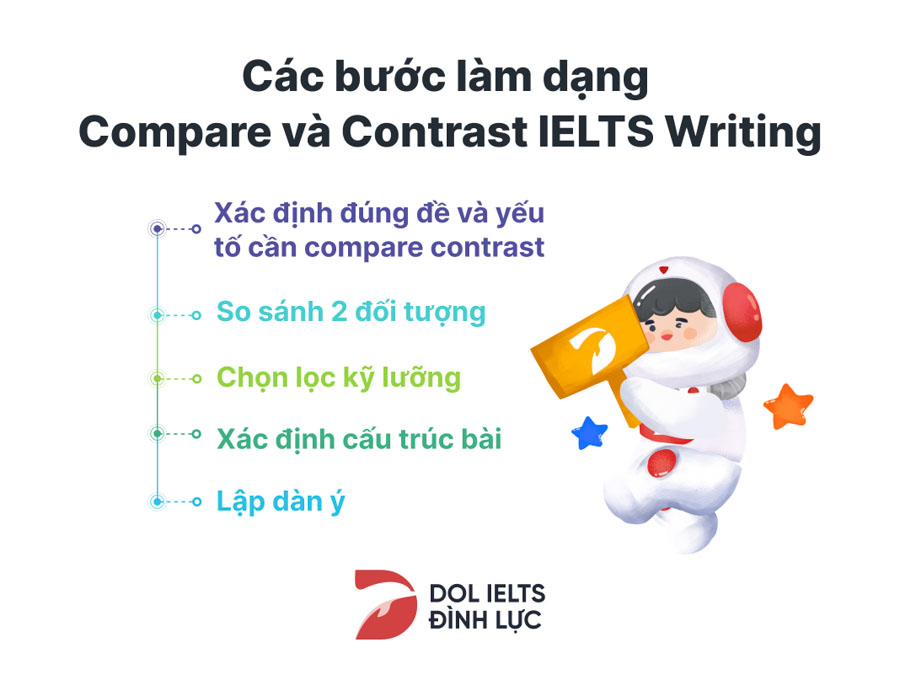
2.1. Xác định đúng đề và yếu tố cần compare contrast
Đây là bước tối quan trọng để không lạc đề.
2.2. So sánh 2 đối tượng
Liệt kê các điểm giống và khác của 2 yếu tố. Bạn có thể sử dụng sơ đồ Venn để liệt kê nhé. Hình minh họa như dưới:
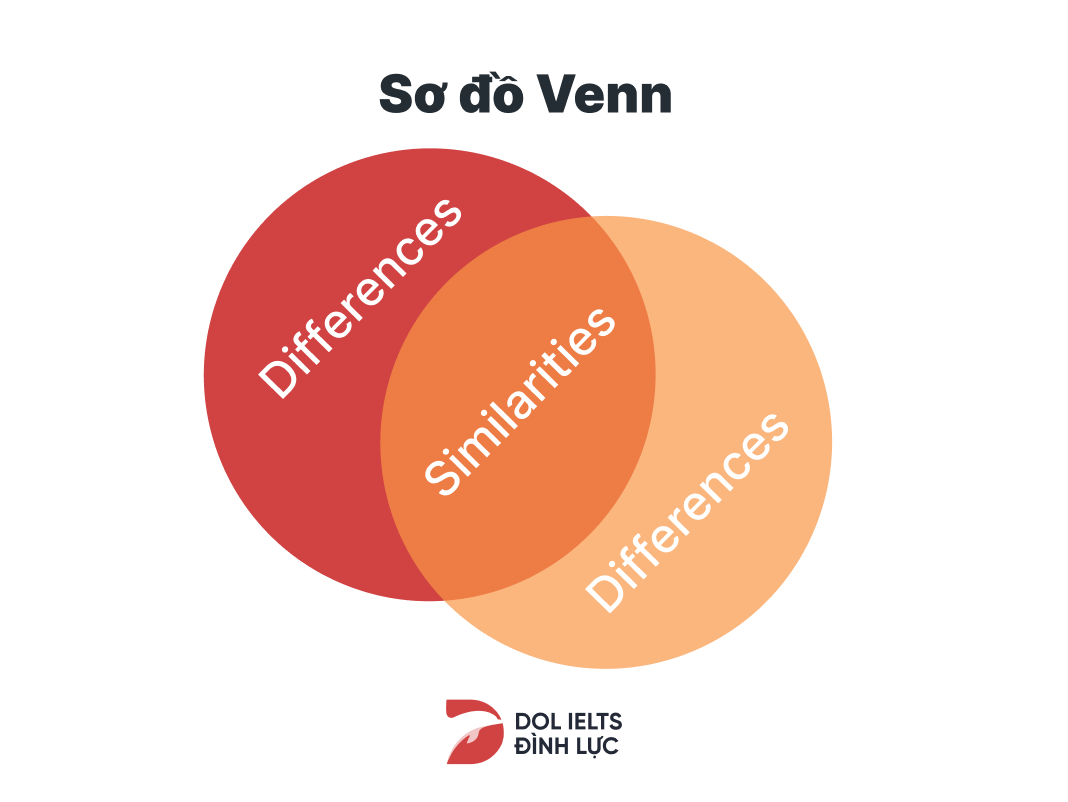
2.3 Chọn lọc kỹ lưỡng
Sau khi list ra các điểm giống và khác của 2 yếu tố, bạn cần tiến hành chọn ý để trình bày. Hãy chọn ý bạn có thể phát triển tốt nhất (nhiều từ vựng và ý để giải thích).
2.4 Xác định cấu trúc bài
Với dạng bài compare and contrast, ta có 2 cấu trúc chính được sử dụng là point-by-point organization và block organization. Trong đó hiểu đơn giản thì:
Point-by-point: Phân tích từng luận điểm theo đoạn
Block: Phân tích từng đối tượng theo đoạn
Ví dụ đề:
Some people want to live in a house while others prefer living in an apartment.
Does living in a house bring more advantages than living in an apartment?
Với Point-by-point, bạn sẽ phân tích
Body 1: Benefits of living in an apartment/a house
Body 2: Issues of living in an apartment/a house
Với Block, bạn sẽ tiếp cận:
Body 1: Benefits and Issues of living in a house
Body 2: Benefits and Issues of living in an apartment
2.5 Lập dàn ý
Tương tự các loại bài khác của writing task 2, cấu trúc của dạng compare and contrast cũng tương tự gồm 3 phần chính, phân cụ thể như sau:
Introduction- Giới thiệu- Paragraph 1
Sentence 1: Paraphrase đề
Sentence 2: Thesis statement
Body 1- Đối tượng/Luận điểm 1- Paragraph 2
Sentence 1: Lợi ích/vấn đề
Sentence 2: Giải thích
Sentence 3: Ví dụ
Body 1- Đối tượng/Luận điểm 2- Paragraph 3
Sentence 1: Lợi ích/vấn đề
Sentence 2: Giải thích
Sentence 3: Ví dụ
Conclusion- Kết luận - Paragraph 4
Paraphrase answers
Bốn đoạn văn là đủ để giải thích quan điểm của bạn trong dạng bài luận này. Thí sinh có thể sử dụng bất kỳ cấu trúc nào khác mà họ cảm thấy thoải mái nhưng cấu trúc này đã được các giám khảo IELTS chấp thuận để giúp học viên viết một cách hiệu quả và có tính liên kết.
https://ieltsonlinetests.com/writing-tips/how-write-compare-and-contrast-type-essay-ielts-writing-task-2
3. Cấu trúc và từ vựng thường dùng
Compare | Contrast |
Similarly | However |
Likewise | In contrast |
also | In comparison |
both … and … | By comparison |
not only… but also… | On the other hand |
neither…nor… | while |
just like + N | whereas |
similar to + N | but |
to be similar to | to differ from |
to be the same as | to be different from |
to be alike | to be dissimilar to |
to compare to/with | to be unlike |
Chú ý là khi sử dụng compare/contrast words, bạn không được nhầm khi đưa ra ý sau những từ này. Ví dụ:”A is smart and well-behaved. In contrast, B is strong and tall.”
=> 2 câu này không hề contrast, viết vậy là sai nha.
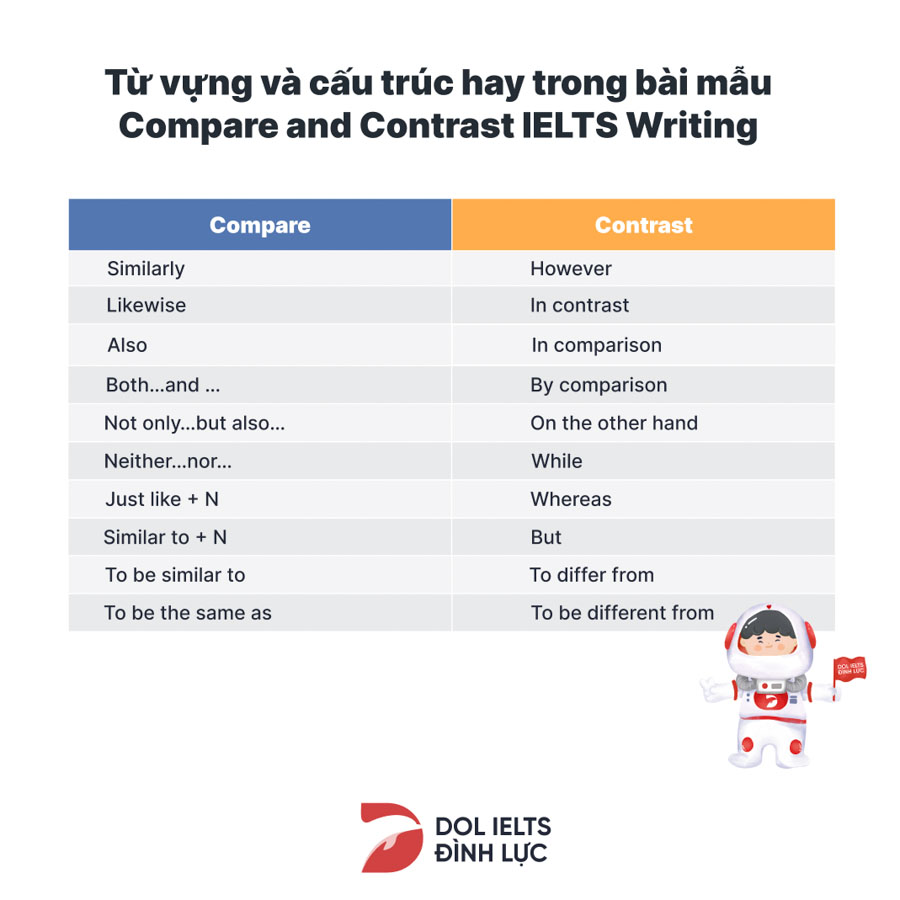
4. Bài mẫu Compare and Contrast IELTS Writing
Some people want to live in a house while others prefer living in an apartment.
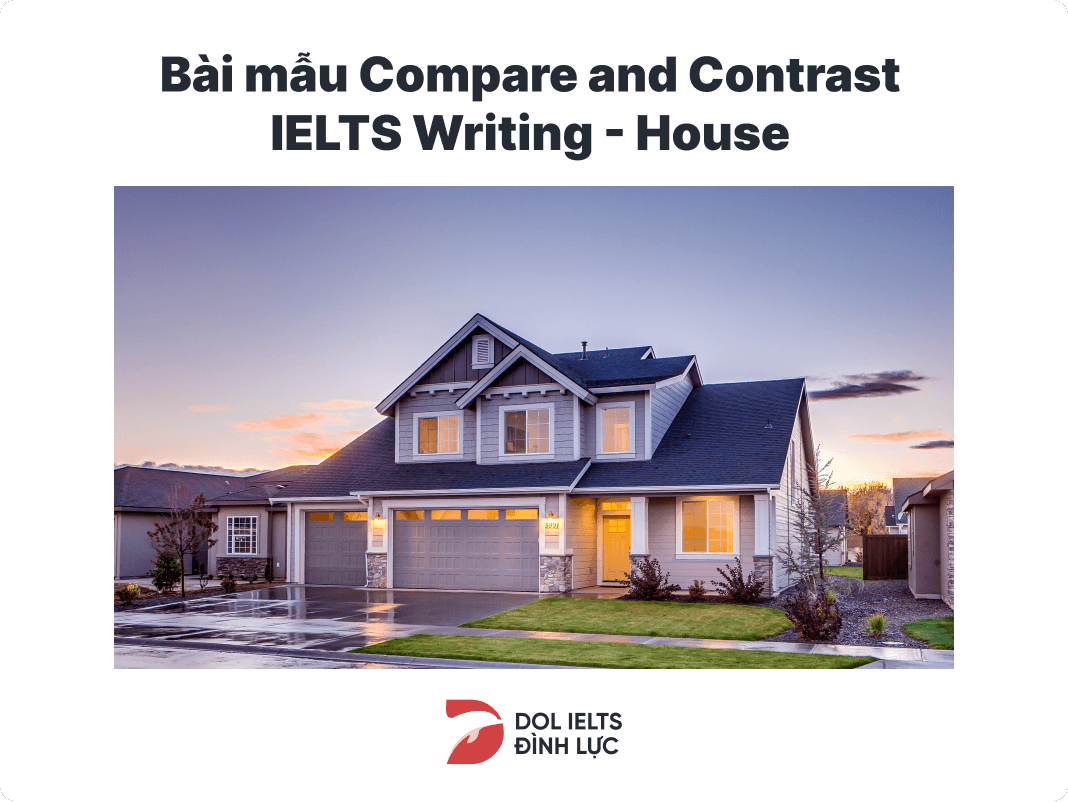
House
Today, a home may be the ideal dwelling for certain individuals, while an apartment may be more suitable for others. Personally, owning a property is preferable to renting one as renting does not ensure stability, but purchasing a home might increase one's equity over time.
On the one hand, the most significant disadvantage of home ownership is its expensive initial expenditures. In most places around the world, the closing costs on a mortgage may amount to as much as fifty percent of the purchase price. These expenditures include fees such as property taxes, mortgage insurance, and house inspection, all of which are prepaid mortgage interest. Buying a home in this manner might leave a family at a financial disadvantage for decades. Comparatively, renting an apartment enables more financial flexibility. One is not required to be concerned over repair and maintenance charges as it is the landlord's obligation. Other expenditures, such as house insurance, fire insurance, and property taxes, are neither the tenant's responsibility. Individuals who choose to rent can save and budget appropriately and may subsequently invest their resources elsewhere.
On the other hand, even though renting a property boosts one's financial independence, it does not guarantee stability; thus, I believe that having total home ownership delivers more substantial advantages. Firstly, renters have no ownership rights. There is always a risk of a 30-day eviction notice issued by the landlord. Moreover, rent prices are likely to increase following each lease review, demonstrating the market's volatility. Consequently, renters are compelled to maintain steady employment or risk being evicted. In contrast, investing in residential assets benefit homeowners rather than property management firms or landlords. Also, while interest rates might fluctuate based on the borrower's credit score, they are often consistent. Ultimately, as individuals make mortgage payments, they accumulate equity, a secure long-term investment. In conclusion, living in a home is preferable to living in an apartment since renting a house does not guarantee stability, whereas acquiring a house may increase one's long-term equity.
Apartment
Certain individuals nowadays might regard an apartment as their optimal lifestyle, while others may favor a home. Personally, renting an apartment is more practical than owning a house as the latter involves more financial risks, whereas the former provides greater financial freedom.
On the one hand, there are positive aspects to being a homeowner. At the time of purchase, home-buyers can choose between an existing framework or their proposal, in which they may customize each room according to their preferences and desires. Hence, private outdoor amenities like courtyards and swimming pools are standard house features. In contrast, apartment tenants are not legally permitted to modify the building's appearance or surroundings. Outdoor spaces in residential blocks are thus often shared with other neighbors. As demonstrated, losing privacy in such public areas would be a major inconvenience.
On the other hand, I genuinely think these private pools and gardens are excessively luxurious, and renting a residence is still more cost-effective overall. Purchasing a house is, firstly, a substantial investment, and larger purchases involve more risks. If the market collapsed, home values would plunge, and mass foreclosures would inevitably occur. Consequently, many families would be forced to sell their houses at a massive loss, and many more would be unable to fulfill their mortgage payments. In comparison, problems involved with renting are often insignificant since tenants typically only, at most, forfeit the one-month security deposit, which is a risk that the average individual can afford to overcome. Renting might also offer the financial flexibility to invest in several different areas, thereby drastically reducing the likelihood of over-commitment and its potential consequences.
In conclusion, from my perspective, acquiring a house involves more financial risks, while renting a property provides higher liquidity. Thus it is certainly the more advisable approach.
Question: There have been many advances in technology over the past fifty years. These have revolutionised the way we communicate with people who are far away. Compare and contrast methods of communication used today with those which were used in the past
In the last fifty years, there have been several technological developments. These have transformed the method by which we connect with distant individuals. Although oral and written means of communication practiced now and in the past are somewhat similar, both have been vastly enhanced in terms of reliability and speed.
On the one hand, oral and written forms of long-distance verbal information transfer have followed a similar pattern during the last several decades. In the 1970s, the most prevalent communication method was verbal communication through mobile phones. During this period, phone models were already entirely portable. However, they had a colossal appearance and barely fit in a shirt pocket. Furthermore, technology at the time was relatively limited since radio waves often interfered with voice intelligibility. Likewise, written communication, a formal mode of communication, has been equally dominant throughout the years. This method is the slower, more reliable communication since it is preserved as a reference or legal record. Because of this sophisticated nature, various forms of written communication, such as letters, are favored in the business world.
On the other hand, these communication channels have expanded their capacities, mainly their speed and quality. Smartphones have replaced the mobile phones of yesteryear with elegant designs that are readily accessible. Smartphones now provide phone conversations with videos with exceptional visual and audio quality. With the push of a button, anyone around the globe can engage in a phone or video call. Just as spoken communication has evolved, letter writing in the contemporary era has also significantly improved. Email, or electronic mail, may now be transmitted instantaneously to many recipients, with the ability to attach several pages of documents and high-resolution images. As demonstrated, technological advancements in the current era have indeed redefined our communication methods.
In conclusion, although mobile phones and letters used in the past and present are comparable, their effectiveness and efficiency have vastly increased.
DOL hy vọng là bài viết trên về compare and contrast essay sample IELTS đã giúp bạn biết nhiều hơn về dạng bài này để có thể áp dụng tự học hiệu quả.
Nếu có bất kỳ thắc mắc gì về IELTS Speaking hay các kỹ năng, đừng ngần ngại mà liên hệ DOL qua các kênh sau bạn nhé: website, Facebook.
Chúc bạn thành công.
Câu hỏi thường gặp:
Những chủ đề thường gặp trong dạng bài Compare and Contrast IELTS Writing
Friends Vs. Family
Childhood friendship Vs. High school friendship
Bikes vs. cars
Study abroad Vs. Studying in your country
Living on your own Vs. At home with my parents
Facebook vs. Twitter
In-house employees Vs. Freelance contractors
Những điều cần lưu ý khi làm bài dạng Compare and Contrast IELTS Writing
Trước khi viết, cần xác định chính xác 2 đối tượng cần so sánh, đối chiếu
Nên liệt kê những điểm tương đồng và khác biệt của 2 đối tượng ra giấy
Xác định rõ đâu là những ý chính cần được nhấn mạnh trong bài viết
Liệt kê ra 1 số luận điểm chứng minh cho những ý chính
Đảm bảo cấu trúc bài viết đầy đủ các phần mở bài, thân bài, kết bài
Đừng quên chú ý đến dấu câu
Hãy kiểm tra lại bài khi đã làm xong
Một số từ vựng thường dùng trong dạng bài Compare and Contrast IELTS Writing
Từ vựng Compare: Similarly; Likewise; also; both... and…; not only... but also…; neither... nor…; just like (+ noun); similar to (+ noun); to be similar (to); to be the same as; to be alike; to compare (to/with).
Từ vựng Contrast: However; In contrast; In comparison; By comparison; On the other hand; while; whereas; but; to differ from; to be different (from); to be dissimilar to; to be unlike.
Gợi ý 1 số đề ôn luyện dạng bài Compare and Contrast IELTS Writing
There have been many advances in technology over the past fifty years. These have revolutionised the way we communicate with people who are far away. Compare and contrast methods of communication used today with those which were used in the past.
It is often cited that “Not everything that is learned is contained in books”. According to many, we learn most of the things from our own experience while others believe that books are our main source of knowledge. Compare and contrast knowledge gained from experience with knowledge gained from books. In your opinion, which source is more important? Why?
Table of content
1. Giới thiệu dạng bài Compare and Contrast IELTS Writing
2. Hướng dẫn cách làm Compare and Contrast IELTS Writing
2.1. Xác định đúng đề và yếu tố cần compare contrast
2.2. So sánh 2 đối tượng
2.3 Chọn lọc kỹ lưỡng
2.4 Xác định cấu trúc bài
2.5 Lập dàn ý
3. Cấu trúc và từ vựng thường dùng
4. Bài mẫu Compare and Contrast IELTS Writing

